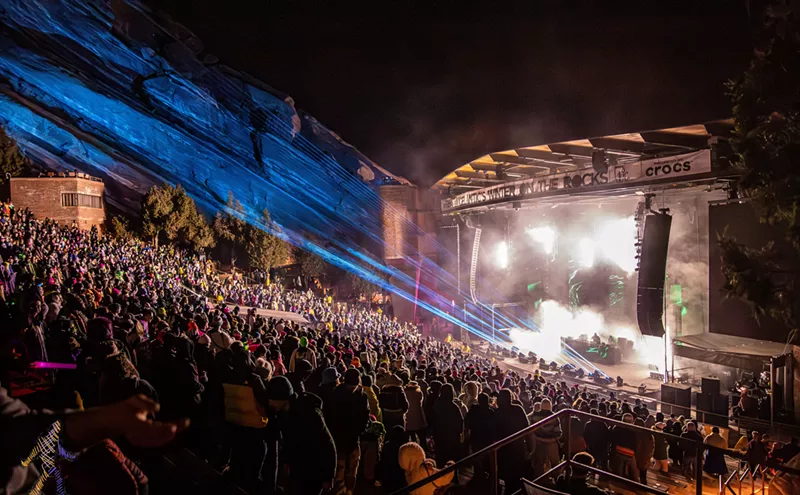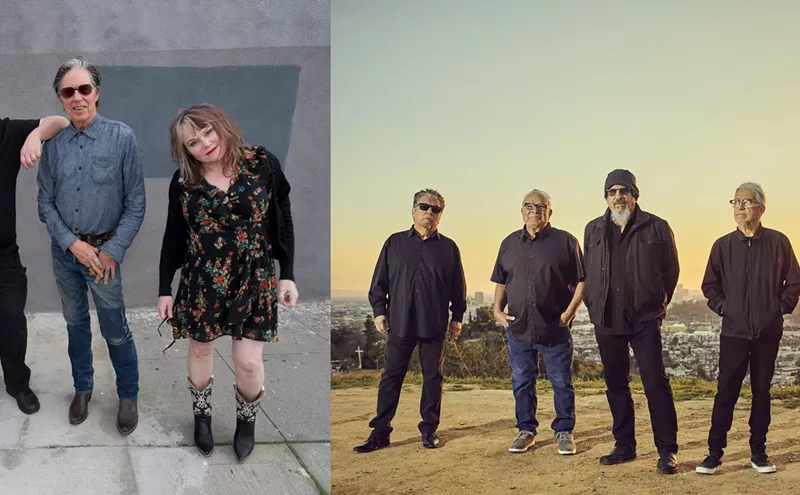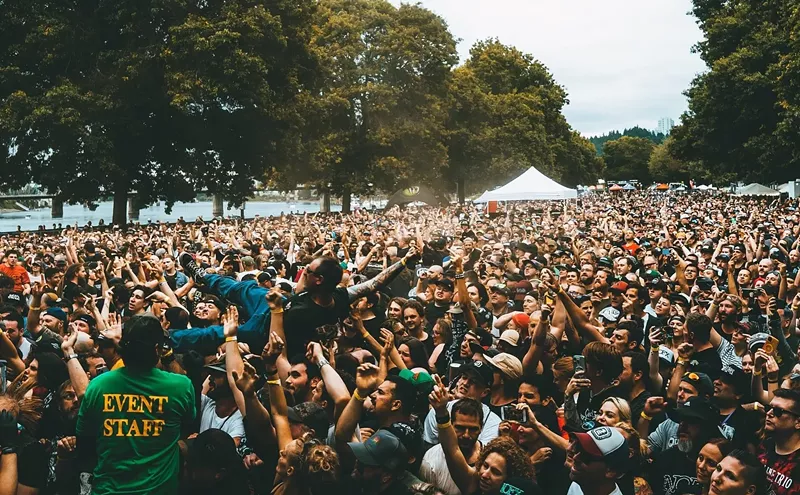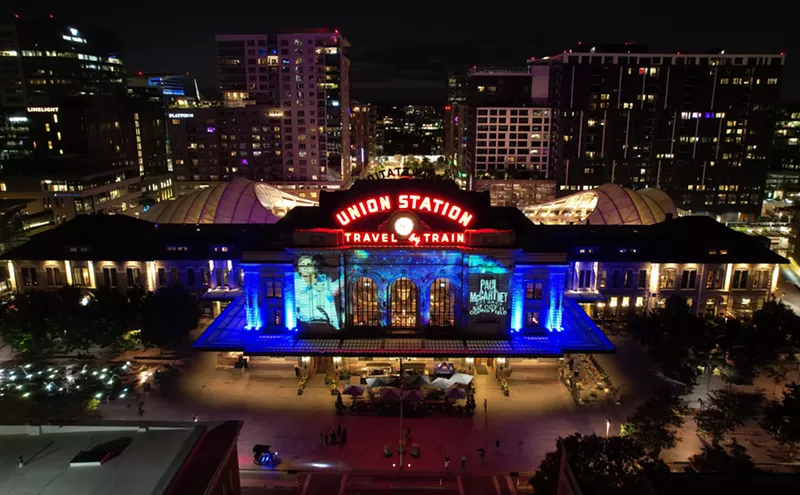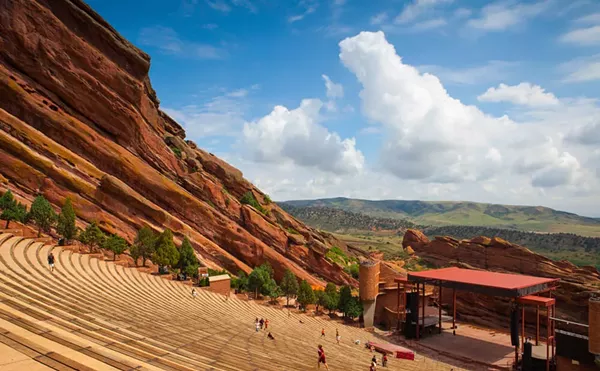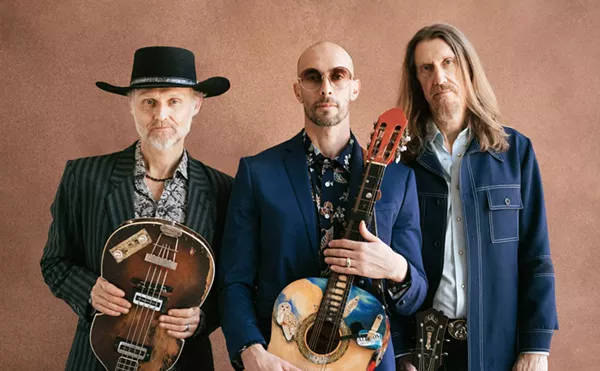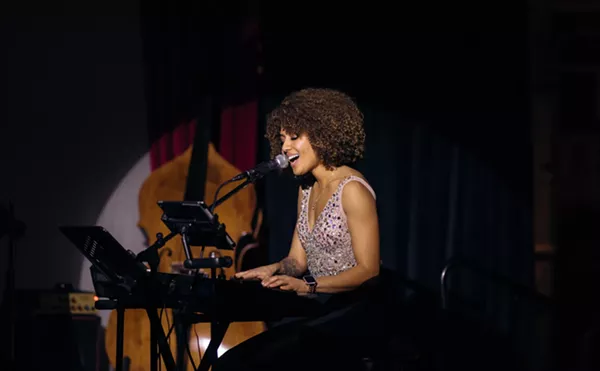Plants and Animals (due tonight at the hi-dive) began life as an all-instrumental band in Montreal that made sprawling rock epics informed by an improvisational sensibility. But by the time the band was ready for its 2008 debut full-length, Parc Avenue, it no longer seemed to feel the need to explore all directions at once. While that record still showed signs of the trio's origins in more progressive improv, it also displayed hints of where the act would go next.
The moodier, darker La La Land sounded like a record Neil Young might have made with Wire as his backing players, and the album's tighter songwriting showed the fascinating ability the outfit had for reinvention. On its latest release, The End of That, the outfit explores the existential dilemmas of people in their late twenties, when you're kind of through figuring out who you are and now need to discover what you're about; it's half modern indie pop and half a meditation on lessons learned from the past on what gives music a compelling warmth and resonance. We spoke with the sharp and affable multi-instrumentalist Nicolas Basque about the band's evolution and the new album, which mixes new sensibilities with those from another time.
Westword: This is from a while back, but what made you want to cut back from writing sprawling instrumentals to something more pop-oriented?
Nicolas Basque: I think it came naturally. When we did instrumental music, we were just out of university, and it was part of the project that Warren [Spicer] had received a grant for. It was more like we were all students of composition, and we were really into Jim O'Rourke and Steve Reich and minimal music. So we wanted to do something along those lines, but with guitar and drums. That's how we started that band, basically, with twenty-minute instrumental songs.
At the same time, Montreal had a lot happening. A lot of venues were opening, and a lot of bands were passing through town. So we were often asked to open for bands. We ended up showing up, opening for some bands with no song really planned out. It was just improvised, like playing on two chords and jamming forever. For a time, Warren and Woody [Matthew Woodley] were in a band where Warren was starting to sing more.
He always sang, but never in the context of our band. He wrote a song once, "Mercy," from Parc Avenue, which has vocals, and he worked on that idea, and when we played that song live, people seemed to enjoy it even more. It was more structured, but it came naturally. We developed the tools with the instrumental band, but we really felt like we were making another project after a while. Warren wanted to sing more and we felt it was better for us, so that's how it worked out.
Your first full-length album, Parc Avenue, has been described as kind of coming from the creative perspective of an eight-year-old. What kinds of experiments did you try out then that led to choices you made for changes for your second album?
I think a lot of it was the touring, playing more together. Parc Avenue is a bit all over place, and I think that's something that's charming about it, too. But when we finished it and were thinking about another record, it's something we wanted to change, because we thought if we did the same all-over-the-place thing, it's not original, and we didn't want to do that all the time.
That's something we wanted to change, and I think that change had a lot to do with the recording process. Parc Avenue has [more of an] an arts-and-crafts kind of feeling to it than our other albums. We learned a lot in the recording process in how to get better sounds and guitar tones.
We didn't do that with La La Land, but something that we always thought was missing was to have the lyrics more fully formed in the writing process. We often had a song tracked and we didn't know what it would be about. That's something we wanted to challenge ourselves to do. To add the lyrics a bit before, have them worked out and sang and knowing what would happen when with the lyrics. And not, "Oh, I wish I knew that word came there; I would have played that differently."
Even with La La Land, we added the lyrics later. I think with The End of That, everything was written before we tracked, so most of the songs were sung live -- which is a plus for us, because we had a tendency to do vocal takes forever on the other records, and probably some of the first takes were better. Having the vocals live was like, "Okay, that's what it is. It's good." We didn't go back, because the emotion tends to be diluted after a few times.
I guess also we learned a lot with Parc Avenue because we engineered some of it, but a lot of it was done at Warren's apartment. The vocal overdubs and even some back tracks were done in his apartment on the 24-track. So there was a lot of learning of mixing work, how to repair stuff and details that are important to know. I think we learn a lot from every record. You finish and you think, "We could have done that, opened that door."
So La La Land represented adolescence in the thematic trajectory of your work. What is it about that time in life do you feel is reflected on that album, and does the title refer to being kind of out there daydreaming?
I think there's a dark side to La La Land. It's more than even the lyrics. I think musically there's something more down on that album. I think there's something about that which sometimes in adolescence you're searching for what you want to do. There's a naive aspect that's not there anymore. I think in the singing there's a Bowie-esque aesthetic. On that album, I think Warren wanted to sing not in character like Bowie would do, like in a Broadway show or something, but play a bit with that. I think there's some of that search for who you are.
Maybe that also related to how I said earlier we were seeking more unity and maybe something clearer. But at the same time, I think it's an experimental record in the sense of trying stuff out. I think that relates to the quality in adolescence where you search for who you are and also you're a bit darker. There's a messy side to it, and even though I think that record has a great sound, I think things are bleeding into one another. I think we wanted to change that for the record afterward.
Also in adolescence there's a lot of angst.
I don't think we saw it at the time, but I see it now that it was a reaction to things we liked less about Parc Avenue or wanted to change. With touring, there's stuff we wanted to play louder or not as loud, and I think that [awareness is reflected on La La Land as well].
Other than maybe having the time and resources to not make The End of That in a kind of last-minute, ramshackle manner, how did having a large amount of material help in changing the approach, and did something emerge in the writing and then preparation to record that suggested an album rather than maybe a collection of songs hobbled together?
I think that's true for that record. I think we approached the record with a sense of nostalgia. I think I like the concept of the album as a story. We live in an era where people have just a couple of songs on their iPod from any particular artist and stuff like that. But there is something we thought, with our own way of working, to approach it as an album. I think we always did that, and for this one we wanted a greater sense of unity than in the past.
We kind of went into our own space for a couple of months and just jammed on new ideas and new songs without limits. But when it was time to go the studio, we made choices on the songs we would record. We recorded more than what came out on the record, but when we sequenced the album, we spent a lot of time with a couple of friends just listening and figuring out the story of the record -- what happens when you put it on. And we tried to keep in mind what side B would be like if you listened to the vinyl. I think people actually care about that, and I think if you put care into what you do, it translates to some people.
In a March 17, 2012, interview with the Vancouver Sun, Matthew [Woodley] mentioned that a more 1970s sound emerged in the recording of your new album. What inspired that kind of mood in the songwriting?
There was kind of a golden age of recording in the '60s and '70s when there was a lot of money and work in terms of getting the right sound. We like getting the right sound. We're also a rock band with guitars and drums, and it often tends to add that '70s feeling. We use old amps and we record on a board from the '70s. There's also something that maybe came more from Woody and me, but we try to keep in the back of our head giving the song a quality of now.
Even if we're dealing with guitars and drums and not autotune and not tons of synth, we make it still feel like it's from now in a rock context. It's not always obvious. I think it comes in some of the drum patterns or guitar licks; it's an accumulation of music that has been done. We certainly have some of that sound from those years but I think the content and songwriting is certainly modern. I think it translates in terms of sound quality and grainy sounds.
It's like looking at a digital photo and a film photo. There's a grainy edge that's less sharp and there's something really warm about it but ultimately I think it's in the working process and all of that stuff. I'm sure with a computer you can achieve the same sound or close to it. Maybe, again, it's nostalgia, but a lot of those records produced in the '70s have a lot of air, a lot of space, it's not over-saturated or over-compressed.
If we track a song, we try get more tech but not try to compress the vocals like crazy so they're up front. There's more of a performance aspect to the music and that might be more of a quality more from the 70s. It was more like tracks had the band brought together [at the same time] without tons of overdubs afterward.
"Song For Love" has a lead in it very much like David Bowie's "The Man Who Sold the World." Was that intentional?
That's a "quote" for sure. We had the whole song up to that point done. Then I think I did this triplet like a prog rock kind of thing as a joke. Then we thought it was cool and put a dancey section afterward. So we jammed on that and at some point, I thought of that line and thought, "Wow, what if I did that on top of some of that chord progression." So I said, "I've got an idea, let's try it out." Then we did the big triplet thing and jammed on the other part and I came right in with it and everybody laughed hysterically.
You're actually the first one to point that out, and we even thought then, "We can't do that. That's too much. Are we gonna do that?" Nobody ever said anything about that until now, so that's funny. It is pretty much the same line, but I kind of like that it's kind of a quote or something that comes from another place. It wasn't totally conscious when I did it, but as I was playing it, I thought, "Wow, that's exactly the same thing."
It's the musical equivalent of a literary allusion, maybe.
Exactly. It's like postmodern music. It's a dancey part, and Warren added an almost Eagles type of guitar line in the background. It's our "quote" section of the record.
It was interesting to hear some of your spoken interaction in the beginning of "Crisis!" Why did you leave that in?
We had a different version of "Crisis!" that was sharp and clean. But the night before we tracked the song, in honor of the studio where we were, we had a meal and drank wine and thought, "We should try 'Crisis!' It's a fun song. Let's just try it out." We had that clean version, but we were not sure we wanted to keep it. So we went downstairs and did two takes just like that for fun. We had a couple of glasses of wine, and we wanted to have that looseness to see what happens. I think my girlfriend was there playing piano. We were all in the same room listening to each other figuring it out.
A couple of days later, when we were listening to the clean version, we realized it was missing something --it needed to be loose and more like a party. We listened back to the "wine" version and it had a better feel. So we decided to leave the interaction and give the track an almost live feel, a casual feeling. We had a lot of that on the record. At first we had that on almost every song but we decided to clean it up but for that song it made more sense and suited the vibe of the song. It's a lively song so that's why we kept it and that's the only reason.
The album cover is a bit reminiscent of The Last Waltz, by the Band. What informed that sort of artwork, and was the Band an influence on the music you wrote for this record?
The first thing we ever had for the cover is what we have as the photo inside that's a montage of us in the studio. But it's more of an art piece, with 300 photos making one big photo. We didn't have the title at first. When we had the title, it was kind of weird to have The End of That with us in the studio.
It made the record feel like it was about us instead of just being about the music. When we came back and started thinking about the artwork I think Warren suggested something really clean like something iconic like The Velvet Underground and Nico. Which is crazy because it's Andy Warhol, but that's what it is -- it's simple to understand.
We were like, "Oh, why not The End of That written super-clean?" So we found a designer and talked with him about the cover and he came back with a couple of different versions of the title. It had an iconic feeling but it's also timeless. It doesn't give too much. It's like a book cover, almost. It has some of that Last Waltz feeling. It's not too ornamented. We wanted something simple.
We did a cover for Parc Avenue with a lot of people -- a big thing with a lot of friends, and that made sense for that. La La Land was probably our worst cover ever. It's too late, but we were all like, "Why did we do that? Let's make it ourselves next time." Maybe some people like it, but I think the La La Land is terrible. Someone suggested cardboard, too, so it has that rough feeling.
It was the designer who suggested on the back to put "Side A" and "Side B" like on the vinyl. So it's the same thing if you have the CD or the vinyl. At this point people probably buy the vinyl more but the digital download even more. I remember putting for reference that Neu! record with just the name of the band on the cover and I always liked that cover. It fits with them so we thought maybe something along those lines would fit us.
The album's title track and "Lightshow" seem to be about a shift in perspective, maybe a questioning of the outmoded, ill-conceived and immature thinking of your younger years. Referring to "Crisis!" again, what kinds of crises do you think people in their late 20s face and what in terms of existential dilemmas?
It's often like a mid-life crisis. It's a time where people grow up and make life decisions. Get more comfortable with their jobs. Even for us, we see our friends getting more comfortable with certain kinds of jobs and certain kinds of settings. You start to question what you want from life at that point and I think that comes from getting older.
The title of the album refers a bit to something that happens to a lot of people too when they get older, like you see the mistakes you make and the choices you made and patterns you repeat all the time. The End of That is the end of repeating the pattern and making the same mistakes all the time. It doesn't mean it will work but it's more of a decision thing, "I'm going to try to stop doing these things."
I think those songs refer a bit to that with a little hope behind. To be honest, Warren, just before we were working on the record, was actually living some kind of crisis in his life and I think it informed a lot of the lyrics and it felt right to write about it. I don't think all the lyrics apply but I think he wanted to do something really sincere with the lyrics. I think that was his biggest fear as we were working on the album--that those lyrics don't come off as sincere. I remember some critics didn't feel they did but I guess it depends on the listener and how they see it. We wanted something really direct but which was easy to grab on to right away.
Maybe that's something that as you grow older that as an artist you should represent yourself as simply as you can. I remember being in the mastering studio with the engineer and he said, "Oh, that's crazy, you're saying 'Somewhere between a crisis and a pretty good time' in 'Crisis!' I have a friend who is living exactly that way right now."
He had just broken up with his girlfriend and he was in party mode but also felt lonely. I think there's some of that in the music. Like something easy-going but also the content that has some weight as well. I think that's something that comes with getting older. It doesn't necessarily have to be like that but I think a lot of people go through that in their lives.
Obviously you mapped out the sequence of the record. How did you arrive at the order it has because it suits the overall sound and mood of the album?
A lot of the songs had a similar subject when we were deciding what we were going to do for the record. We didn't want to do anything too long. We didn't want to have anything more than fifty minutes or so. There were some songs that were obviously going to make the record and others in the neutral section. Once we had the songs that would make it on to the record, we pieced it together based on the vibe we wanted to convey. We balanced it out and if two songs were too similar or had a similar vibe, we would cut them but we released some of those on iTunes.
There was a similar vibe on everything but there were some songs we wanted to keep off because of the lyrics because we didn't want to make it a theme or concept record. I guess that's the perspective we took in sequencing the album. We wrote some music we added between every song at some point. It was so heavy and I was overthinking the whole thing so we canned that sequence.
We tried to keep it something fun and also have some weight in the content. We wanted to make it more of a bit of a story so there's valleys and mountains. It's more like a journey than something that's always the same thing. I think there's a unity in the sound but there's also a lot of variety in the nuance and the dynamics of the song. If we could have added another song, it would have been the bonus track of "Shaky Shaky Shaky," but I don't think we captured the grandiosity of it.
Maybe we'll try it again but we still released it because I think the recording is good and it's a really good performance. It's like ten minutes and minimal and it's simple and more of a Roberta Flack feeling. There's a song or two we cut that are too crazy and don't make sense on the record.
We gave the songs to a friend of ours to help with the sequencing. We said, "Okay do something with it." He handed me back two CDs and I don't know what he meant and one had songs that were not good enough for the record or didn't make sense. He had a really fun approach in considering what made sense together and what makes every song strong together. That's the perspective we took.
The only consensus, it seemed, that "Before" should be the first track of the record. I think I was the only one that wasn't convinced at first. But everyone else said it was more welcoming. It makes sense to me now more but at the time I didn't know what to think of that. But we wanted to make something that, when you put the record on, was inviting and that took you somewhere.
Follow Backbeat on Twitter: @westword_music



